Ensuring Your Contracts are Enforceable in Nigerian Courts

by Counseal Team
Updated April 21, 2025

Let’s explore something fundamental to business success—contracts. Picture this: You’ve just closed a deal with your dream client. The excitement is palpable, but how do you ensure this promising partnership doesn’t unravel into legal complications? The answer lies in enforceable contracts.
Let’s explore something fundamental to business success—contracts. Picture this: You’ve just closed a deal with your dream client. The excitement is palpable, but how do you ensure this promising partnership doesn’t unravel into legal complications? The answer lies in enforceable contracts.
For Nigerian entrepreneurs, a legally enforceable contract serves as the cornerstone of successful business relationships. It clearly defines rights, responsibilities, and expectations while providing crucial legal protection. In Nigeria’s dynamic business landscape, where regulations evolve and disputes can arise unexpectedly, having an ironclad contract isn’t just good practice—it’s essential for business survival.
An Overview of Nigerian Contract Law
Nigerian contract law follows common law principles, similar to the UK system. At its foundation, every valid contract requires four essential elements: offer, acceptance, consideration, and intention to create legal relations.
Consider a typical business scenario: A Lagos-based manufacturer agrees to supply products to a distributor in Abuja. Their contract must specify delivery timelines, payment terms, and consequences for delays or default. Without these clear terms, enforcing the agreement becomes challenging, if not impossible.
What Makes a Contract Enforceable?
Essential Elements of a Valid Contract
For a contract to stand in Nigerian courts, it must contain:
- Offer and acceptance: A clear proposition and unequivocal agreement
- Consideration: Exchange of value between parties
- Intention to create legal relations: Both parties must intend the agreement to be legally binding
- Capacity to contract: Parties must be of legal age and sound mind
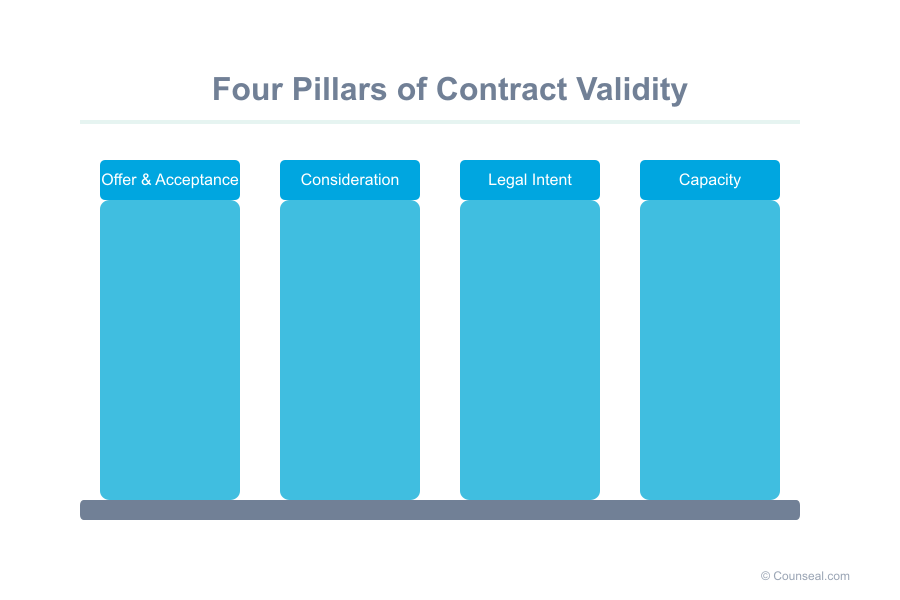
Common Issues Leading to Unenforceable Contracts
Several pitfalls can render a contract unenforceable:
- Improper documentation: Informal or incomplete written agreements
- Ambiguous terms: Unclear or contradictory language
- Lack of consideration: Absence of mutual benefit
- Missing essential elements: Omitting key contract components
Types of Contracts and Their Enforceability
Written vs. Unwritten Contracts
In Nigerian business practice, written contracts provide the strongest foundation for enforcement. While verbal agreements are legally valid, they present significant challenges in court. The Nigerian Court of Appeal has consistently favoured documented agreements, particularly in complex business transactions.
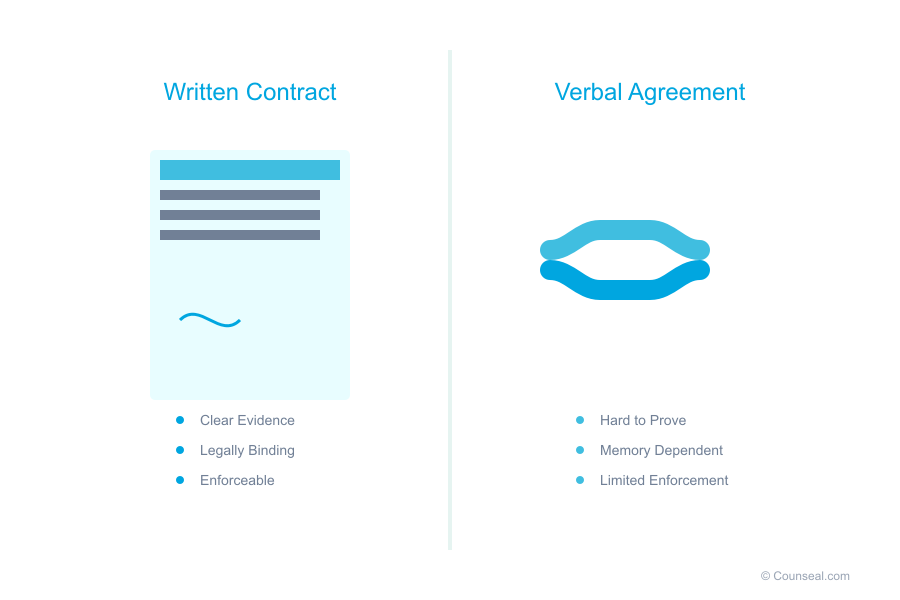
Employment Contracts
Employment contracts require particular attention in Nigeria’s evolving business landscape. Key components include:
- Job description and scope
- Compensation structure
- Working hours and location
- Leave entitlements
- Termination clauses
- Non-compete provisions
Regarding non-compete clauses, Nigerian courts generally uphold them when they’re reasonable in:
- Geographic scope
- Duration
- Business interest protection
For example, a software company in Lagos can restrict an employee from working with direct competitors within Nigeria for one year after employment ends. However, a global restriction or a five-year term would likely be unenforceable.
Ensuring Enforceability in Specific Contract Types
Business Agreements
Importance of Clear Terms and Conditions
Clarity in business agreements is paramount. Your contract should:
- Define all technical terms
- Specify deliverables and timelines
- Outline payment terms and conditions
- Include dispute resolution procedures
- State governing law and jurisdiction
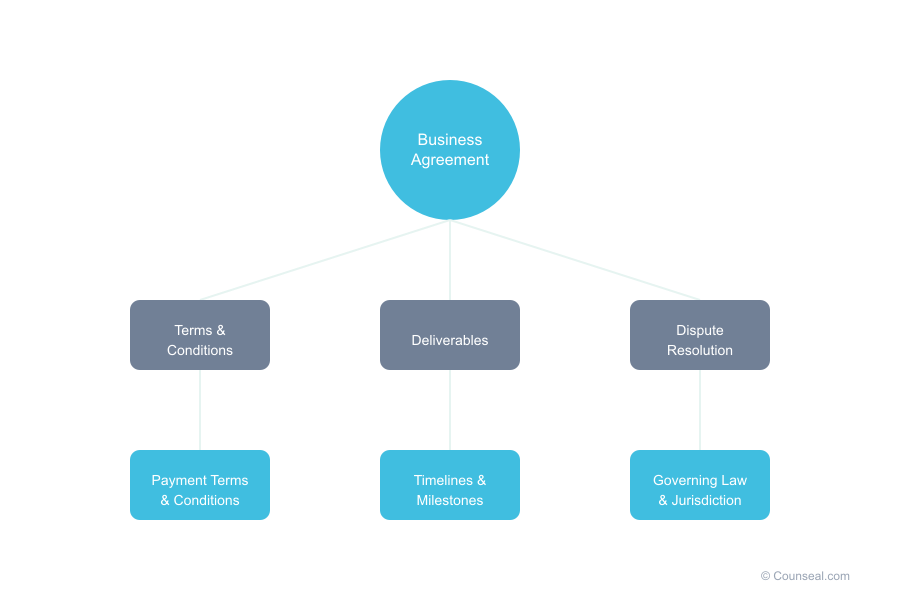
Role of Privity of Contract
Privity of contract, a fundamental principle in Nigerian law, ensures that only parties to the contract can enforce its terms. This protection is crucial in Nigeria’s interconnected business environment, where multiple stakeholders often have interests in business dealings.
Memorandum of Understanding (MoU): Legal Standing
MoUs serve as preliminary agreements in Nigerian business practice. While not automatically binding, they can become enforceable when properly structured. Key elements include:
- Clear intention to be bound
- Specific obligations
- Definite terms
- Consideration
Making MoUs Enforceable
To strengthen an MoU’s enforceability:
- Include specific performance obligations
- Add confidentiality clauses
- Insert dispute resolution mechanisms
- Specify governing law
- Include signature blocks and dating
Practical Steps to Ensure Enforceability
Drafting Clear and Comprehensive Contracts
Tips for Clear Drafting
- Use simple, precise language
- Define technical terms
- Structure clauses logically
- Include all material terms
- Specify performance metrics
- Address potential contingencies
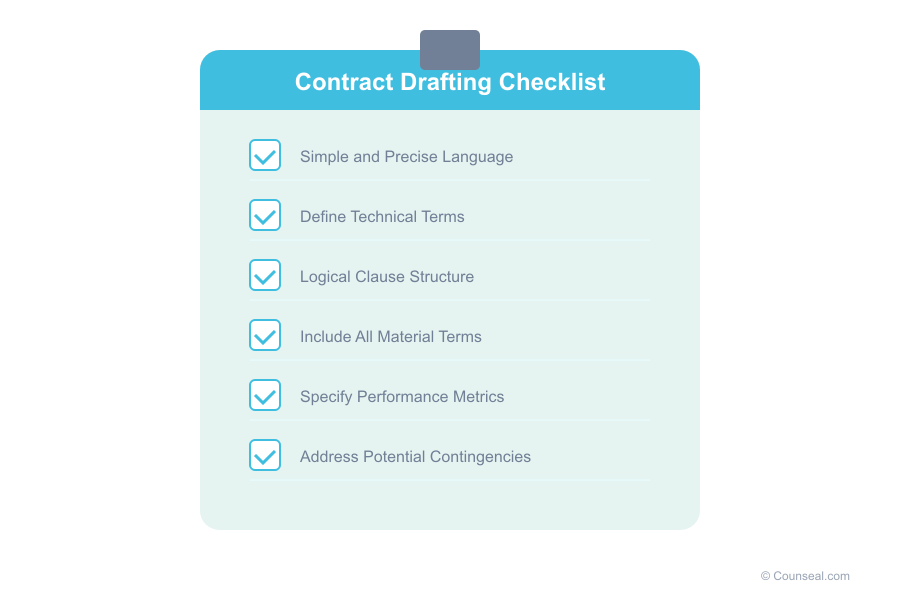
Common Pitfalls to Avoid
- Vague or ambiguous language
- Inconsistent terminology
- Missing essential terms
- Unrealistic obligations
- Conflicting clauses
- Improper execution
Including Jurisdiction Clauses
A well-drafted jurisdiction clause specifies:
- Governing law (Nigerian law)
- Court jurisdiction (specific state or federal court)
- Alternative dispute resolution options
- Enforcement mechanisms
Agreeing to Agree
Future agreements must include:
- Framework for negotiation
- Timeline for finalisation
- Default terms if agreement fails
- Decision-making process
- Dispute resolution mechanism
Key Takeaway Points
Ensuring contract enforceability in Nigerian courts requires:
- Proper documentation
- Clear terms and conditions
- Valid consideration
- Proper execution
- Compliance with Nigerian law
- Effective dispute resolution mechanisms
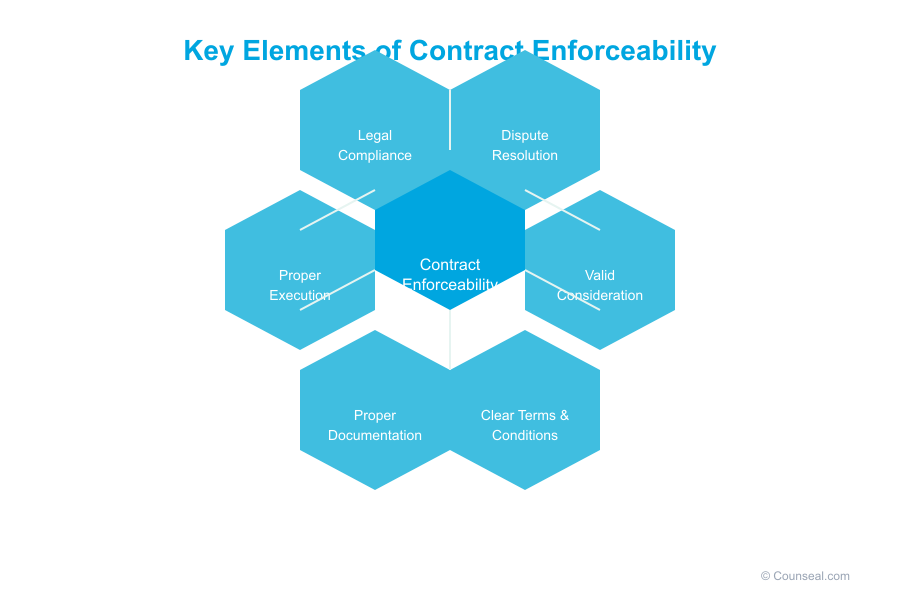
Expert Legal Support
While this guide provides fundamental principles, each business situation is unique. Protect your interests by seeking professional legal guidance. Visit counseal.com/start to connect with experienced Nigerian legal professionals who can help craft and review your contracts.
Remember, a well-drafted contract isn’t just paperwork—it’s your business insurance policy. Invest time in getting it right, and you’ll build stronger, more secure business relationships in Nigeria’s dynamic market.





